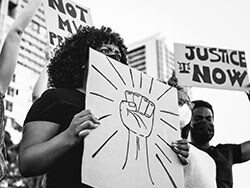When George Floyd was killed on May 25, 2020, protests against police violence erupted around the nation. But this was not the beginning of the Black Lives Matter (BLM) movement. That began in 2013 after George Zimmerman was acquitted of the murder of Trayvon Martin, a young Black man. For the past 8 years, BLM activists have been working not only to end police violence against Black people but also to address systemic racism throughout society. The BLM website describes the BLM mission starkly: “We are working for a world where Black lives are no longer systematically targeted for demise.”

Racial inequities extend to healthcare, and the COVID-19 pandemic has brought those systemic inequities into sharper focus. According to the CDC, Black people are at far greater risk than are White people of contracting COVID-19, being hospitalized as a result, and dying of the illness.
Social media is an obvious place for hospitals to signal to the Black community that hospitals are caring, safe places. Because it has been shown that outcomes are better when patients believe their healthcare practitioners care about them, public statements about the issues raised by the BLM movement could have a powerful impact on the health of the Black community.
With this in mind, researchers analyzed the content of Twitter posts by the 100 top-ranked hospitals over a roughly 11-year span. The study, published online October 15 in JAMA Open Network, found that hospitals have not shown robust support in social media for the Black community, a finding that could endanger lives.
Late to the Game
Researchers used the Newsweek list of the world’s best hospitals for 2020 to select 100 US hospitals for inclusion in the study. They then collected tweets from the official Twitter accounts of the hospitals from May 3, 2009, to June 26, 2020.
They identified tweets with hashtags related to issues important to the Black community, such as #BLM, #BlackLivesMatter, #racialjustice, and #justiceforGeorgeFloyd. They examined themes in four categories: support for BLM, black support, black health, and social justice. The researchers found that hospitals’ engagement with these issues was low — and late in coming.
Only four BLM tweets were posted prior to the killing of George Floyd. The first of these was posted in 2018, 5 years after the movement’s founding; 270 BLM tweets were posted after Floyd’s death. Of 281,850 tweets from 100 hospitals and 90 unique Twitter handles (user names) during the period covered by the study, 0.097% were directly supportive of the BLM movement. Tweets signaling black support made up 0.086% from 42 handles; black health was the subject of 0.099% of tweets from 15 handles; and social justice was the subject of 0.014% of tweets from 21 handles.
These results suggest that hospitals could do a better job of publicly voicing via social media their concern and compassion for their Black patients and Black people in the communities they serve.
Yulin Hswen, MPH, lead author of the study, points out that healthcare culture is traditionally more focused on biological traits and diseases than on social determinants of health, although social determinants of health have been shown to be as important as biological and genetic factors. “Social justice is a part of health,” says Hswen, assistant professor of epidemiology and biostatistics at the University of California, San Francisco. “Police brutality obviously impacts the health of these populations and goes beyond the individuals who need treatment. It’s not just treatment of individual wounds, but of societal wounds,” Hswen said.
“Imperative” for Hospitals to Support the Black Community
The researchers acknowledge that the study was limited to a specific set of hashtags and one social media platform, although Twitter is the platform most commonly used by BLM and by advocates of social justice. The authors note in the study that if hospitals wanted to signal their support for these issues, they would be active on the site and would choose the hashtags most used by BLM and social justice activists.
Also, because the study was limited to hospitals that made the Newsweek top 100 list, the results do not reflect community or minority-based hospitals that may have been more sensitive to and engaged with the Black communities they serve.
Hswen points out that this study shows that society needs to start focusing on how we evaluate medical care. “Just because you’re the best for some people doesn’t mean you’re the best for everyone,” she points out. “We need to start focusing on how we evaluate what is best, and equity needs to be a part of that.”
She adds that hospitals need to “generate an institutional culture around this kind of support.”
Hswen and her fellow researchers elaborated in the report: “It is imperative for hospitals to be supportive of the Black community and acknowledge themselves as safe spaces, run by clinicians and staff who care about social justice issues that impact the health of the Black community; without the expression of support,” the report notes. “Black patients may perceive hospitals as uncaring and unsafe, potentially delaying or avoiding treatment, which can result in serious complications and death for those with COVID-19.”
With this in mind, researchers analyzed the content of Twitter posts by the 100 top-ranked hospitals over a roughly 11-year span. The study, published online October 15 in 664441422 JAMA Open Network, found that hospitals have not shown robust support in social media for the Black community, a finding that could endanger lives.
JAMA Netw Open. Published online October 15, 2021. Full text
Avery Hurt is a freelance science and medical writer.
For more news, follow Medscape on Facebook, Twitter, Instagram, and YouTube.
Source: Read Full Article
